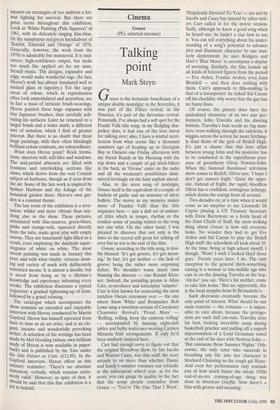Cinema
Grease (PG, selected cinemas)
Talking point
Mark Steyn
Grease is the fortunate beneficiary of a unique double nostalgia: in the Seventies, it was part of the Fifties revival; in the Nineties, it's part of the Seventies revival. Personally, I've always had a soft spot for the Franki Valli title song: in my fledgling disc- jockey days, it had one of the best intros for talking over; also, I have a wistful recol- lection from what seems like a thousand summers ago of heading up to Georgian Bay in Ontario one Friday afternoon with my friend Randy in his Mustang with the top down and a couple of gal hitch-hikers in the back, as 'Grease' came on the radio and all the weekend's possibilities shim- mered invitingly on the hazy asphalt ahead.
Alas, to the siren song of nostalgia, Grease itself is the equivalent of a couple of bushels of garlic and an armoury of silver bullets. The movie in my memory makes more of Frankie Valli than the title sequence here — just a dull set of animat- ed titles which in tempo, rhythm or the crudest sense of pacing relates to the song not one whit. On the other hand, I was pleased to discover that not only is the intro to the record still great for talking all over but so too is the rest of the film.
Grease, according to the title song, is dou- bly blessed: 'It's got groove, it's got mean- ing.' In fact, it's got neither — the lack of groove being the rather more surprising defect. We shouldn't waste much time blaming the director — one Randal Kleis- ner. Instead, the presiding genius is Allan Can, co-producer and screenplay 'adapter'. Can is best known for concocting the most tasteless Oscars ceremony ever — the one where Snow White and Bratpacker Rob Lowe sang a rewritten version of Creedence Clearwater Revival's 'Proud Mary' 'Rolling, rolling, keep the cameras rolling' — accompanied by dancing night-club tables and bulky waitresses wearing Carmen Miranda fruit arrangements. If only he'd been similarly inspired here.
Can had enough savvy to figure out that the original Broadway show, by Jim Jacobs and Warren Casey, was thin stuff: the story attends to no more than whether Danny and Sandy's summer romance can rekindle in the subsequent school year; as for the score, you can gauge its quality by the fact that the songs people remember from Grease — 'You're The One That I Want', `Hopelessly Devoted To You' — are not by Jacobs and Casey but instead by other writ- ers Carr called in for the movie version. Sadly, although he knew a good song when he heard one, he hadn't a clue how to use it. You can tell everything about his under- standing of a song's potential to advance plot and illuminate character by one mas- terly deployment: he uses Rodgers and Hart's 'Blue Moon' to accompany a display of mooning. Similarly, the film rounds up all kinds of beloved figures from the period — Eve Arden, Frankie Avalon, even Joan Blondell — and then does nothing with them. Can's approach to film-making is that of a trainspotter: he ticked Sid Caesar off his checklist; why worry that the guy has no funny lines.
Of course, the picture does have the undoubted chemistry of its two star per- formers, John Travolta and his dancing bottom. Travolta's butt needs no big num- bers: even walking through the cafeteria, it wiggles across the screen far more fetching- ly than those of the girls of Rydell High. It's just a shame that this love affair between young John and his posterior has to be conducted in the superfluous pres- ence of gooseberry Olivia Newton-John. When the National Bandstand television show comes to Rydell, Olivia says, 'I hope I don't get camera fright.' Quite the oppo- site. Instead of fright, the vapid, bloodless Olivia has a confident, contagious lethargy, which drains the energy from all around.
Two decades on, at a time when it would come as no surprise to see Leonardo Di Caprio playing a US Treasury Secretary with Drew Barrymore as a feisty head of the Joint Chiefs of Staff, the most striking thing about Grease is how old everyone looks. No wonder they had to get Eve Arden and Sid Caesar to play the Rydell High staff: the schoolkids all look about 35. At the time, being at high school myself, I though, Wow! I wish I looked liked those guys.' Twenty years later, I do. The only exception to the general thirty-something casting is a woman in late-middle age who cuts in on the dancing Travolta at the hop. `Ah-ha!' you say. 'Here's his mother, come to take him home.' But no; apparently, this is the local nympho from St Bernadette's.
Such diversions eventually become the only point of interest. What should be our main concern — the romance — is impos- sible to care about, because the protago- nists are such dull cut-outs. Travolta does his best, looking incredibly camp during basketball practice and pulling off a superb impersonation of a Loyd Grossman vowel at the end of his duet with Newton-John 'But eaueaeau those Summer Nights.' Oth- erwise, the only actor who succeeds in breathing any life into her character is Stockard Channing as the tough gal Rizzo. And even her performance only reminds you of how much better the whole 1950s end-of-an-era coming-of-age thing was done in American Graffiti. Now there's a film with groove and meaning.














































































































 Previous page
Previous page